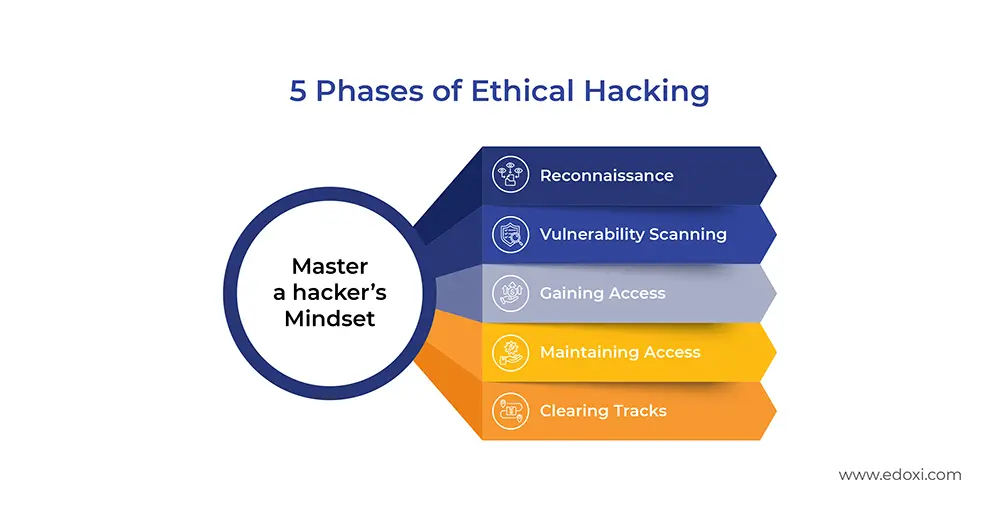Edoxi’s CEH training in London empowers professionals to tackle industry-specific cybersecurity challenges with advanced AI tools and technologies. The CEH v13 course provides comprehensive lab-based training through EC-Council's iLab platform. The training environment features unpatched systems and vulnerable applications, enabling you to practice ethical hacking techniques in a controlled setting.
During the course, you will learn all five phases of ethical hacking, including Reconnaissance, Vulnerability Scanning, Gaining Access, Maintaining Access, and Clearing Tracks. These 5 steps provide a structured approach to identifying, exploiting, and securing vulnerabilities, ensuring a comprehensive understanding of offensive and defensive cybersecurity strategies.

The CEH V13 Course includes guided exercises and real-world simulations. You will develop practical cybersecurity skills that align with industry requirements. Our trainers will also help you develop skills to implement Cybersecurity across industries with Edoxi's Ethical Hacking Training in London.
Our training integrates advanced AI tools from EC-Council’s latest CEH v13 curriculum, enhancing your ethical hacking expertise. The following table showcases all the AI tools that you will be learning.
| Component | Knowledge-Based Exam | Practical Exam (Optional) |
| Exam Code | 312-50 (ECC/VUE) | Via ASPEN iLabs |
| Duration | 4 hours | 6 hours |
| Format | 125 multiple-choice questions | Hands-on practical assessments |
| Passing Criteria | 60%–85% (varies by question weight) | At least 50% of practicals have been completed |
| Certification | CEH v13 | CEH Master designation |
| Validity | 3 years | 3 years |
| Recertification | 120 CECs or retake the exam | 120 CECs or retake exam |
At Edoxi, our learners are more than just students, they are Edoxians. Being part of our learning community comes with a range of exclusive benefits designed to enhance your experience and support your journey toward success.
| Benefits | Details |
| Exam Voucher | Discounted pricing from EC-Council for Edoxians (Standard price: USD 1,199) |
| Study Materials | Complete EC-Council digital courseware access |
| Practical Exam | Discounted pricing from EC-Council for Edoxians |
| Additional Certificate | Course completion certificate |
You will be trained on EC-Council's iLab platform with live networks and real vulnerabilities in a secure setting.
You will learn to identify, analyse, and respond to cybersecurity incidents using advanced tools and methodologies.
You will complete structured exercises like password cracking and exploit testing. Use AI-powered tools for tasks such as vulnerability scanning and malware analysis.
You will learn attacker and defender methodologies to secure systems and mitigate threats effectively.
You will analyse notable cyberattacks to understand vulnerabilities, attack vectors, and response strategies.
You get to engage in scenarios replicating threats like APTs, malware, and network breaches to develop practical skills.
Network administrators, system engineers, and IT infrastructure specialists can enhance their careers with advanced ethical hacking and AI-driven security skills.
Security analysts, ethical hackers, and cybersecurity specialists can upgrade their expertise with the latest AI-powered tools and techniques.
Those with basic IT knowledge and an interest in cybersecurity can build a strong foundation for a career in ethical hacking.
Professionals interested in transitioning to cybersecurity can develop essential skills and industry-recognised credentials through this comprehensive program.
Technical professionals working in software development can expand their security expertise to build and maintain secure applications.
Those responsible for security audits and compliance can gain hands-on technical skills for more effective security assessments.
The CEH v13 course in London offers hands-on labs to help learners gain real-world ethical hacking skills. Our practical training approach ensures a deeper understanding of cybersecurity concepts and better preparation for real-world challenges. Here are some projects and case studies that you will be involved in during the course;
Get access to EC-Council's iLab platform with live networks and unpatched systems. Perform vulnerability analysis and penetration testing in secure, pre-configured environments.
You will simulate real-world cybersecurity challenges, including SIEM systems management and Zero Trust Architecture implementation.
You will master tools like Nmap, Nessus, and Wireshark for network scanning. Perform vulnerability assessments using Burp Suite, Acunetix, and OWASP ZAP.
You get to use advanced tools like ShellGPT for penetration testing, FraudGPT for threat detection, and DeepExploit for vulnerability assessment.
You will complete real-world projects in penetration testing, malware analysis, cloud security, IoT assessments, and incident response.
You will role-play attacker and defender perspectives while analysing historical cyber-attacks. Develop skills in threat detection and incident response.
The Certified Ethical Hacker v13 AI certification unlocks diverse career opportunities in London's thriving technology sector. After completing our CEH V13 training, you can progress through various cybersecurity roles. The following are the CEH V13 course outcomes you can expect after completing our CEH V13 training in London;

Get expert assistance in getting your CEH v13 Course customised!
Here’s a four-step guide to becoming a certified CEH v13 professional.
Join Edoxi’s CEH v13 Course
Here are a few reasons why you should choose Edoxi for CEH V13 in London;
We offer structured learning, expert guidance, and hands-on practice to ensure success in the CEH certification exam.
Enjoy discounted CEH exam vouchers and special rates for the practical certification exam.
Practice in advanced cloud labs with real-world scenarios, vulnerabilities, and pre-configured security tools.
We follow EC-Council's official curriculum, enhanced with AI tools, practical exercises, and expert instruction.
Trained over 10,000 professionals with a consistent record of success in certifications and career advancement.
Major top organisations like the UAE Federal Government, Emirates Digital Wallet, and Saudi Aramco have chosen Edoxi for their cybersecurity training needs.

Our mentors are leaders and experts in their fields. They can challenge and guide you on your road to success!

Maria Mehwish
Maria Mehwish is a forward-thinking and knowledgeable information security leader with a strong background in building, updating, and maintaining digital protections for various organisations. As a certified CEH, CCSP, CCT, and CISSP Trainer, Maria has a proven track record of delivering innovative and immersive coursework, enhancing learning experiences for cyber threats, ethical hacking, security policy, DevSecOps, and cloud security. With excellent verbal and written communication skills, she is also adept at troubleshooting problems and building successful solutions.
Maria is a self-motivated individual with a strong sense of personal responsibility, capable of managing projects from start to finish. Her expertise in Amazon Web Services, Java/Go/Python/C++, DevSecOps, computer security, Linux, penetration testing, and risk analysis, among others, makes her a valuable asset to any organisation. Maria, a British national, is a native English speaker and has intermediate proficiency in Urdu.
Here is the list of other major locations where Edoxi offers CEH v13 Certification Course
The CEH v13 program integrates AI into all phases of ethical hacking. It enhances task automation, improves efficiency by up to 40%, and provides extensive hands-on coverage to strengthen defensive and offensive cybersecurity skills.
While no prior ethical hacking experience is required, our curriculum and trainers ensure confident progress for all participants. Here are some helpful prerequisites:
Yes, you’ll gain expertise in ethical hacking fundamentals, AI-powered tools, vulnerability assessment, system hacking, web and mobile security, and advanced scanning techniques through practical labs and real-world scenarios.